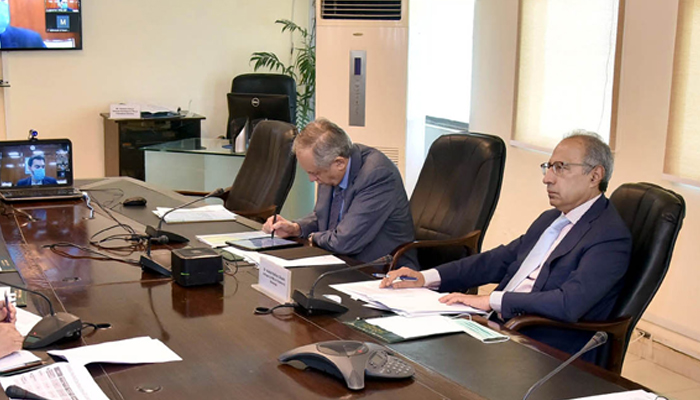Finance secretary says primary balance has surplus of Rs104 billion for first time in nine months
The pandemic has brought multiple challenges for the country’s economy, says Baloch
ISLAMABAD: The primary balance recorded a surplus of Rs104 billion (i.e. 0.2% of the GDP) during nine months from July-March for the FY-2020, as compared to a deficit of Rs474 billion (i.e. 1.2% of the GDP) during the same period of the corresponding year, Finance Secretary Naveed Kamran Baloch said on Thursday.
According to a press release issued by the finance ministry, these views were shared during a meeting of Monetary and Fiscal Policies Co-ordination Board chaired by Adviser to the Prime Minister on Finance and Revenue Dr Abdul Hafeez Shaikh.
Dr Shaikh emphasised upon the need for better coordination among the stakeholders to arrive at a consensus on macro-economic targets and the required policy actions to achieve them.
The adviser said that all organs of the state should play their role in these difficult times and fully capitalise their potential to achieve the set macro-economic targets as per their mandate.
Other members of the board present in the meeting were the Adviser to PM on Commerce and Investment Razak Dawood, Deputy Chairman Planning Commission Jehanzeb Khan, Finance Secretary Naveed Kamran Baloch, Governor State Bank of Pakistan (SBP) Dr Reza Baqir and economist Dr Asad Zaman. Chairperson Federal Board of Revenue (FBR) Nausheen Javaid also attended the meeting on special invitation.
Furthermore, the finance secretary informed the board that the government had embarked on a journey towards stability and sustainable inclusive growth through various structural and policy adjustments that have paid off in the form of decline in current account deficit, fiscal deficit, buildup of foreign reserves, and stable exchange rate, etc.
He also presented a pre and post-COVID-19 overview of the economy and stated that the pandemic had brought multiple economic challenges with it.
Before coronavirus, the GDP growth was estimated at 3.24% for 2019-20 and after the pandemic, it may decline significantly, he added.
The government has timely initiated a Fiscal Stimulus Package worth Rs1.24 trillion encompassing emergency response, support to businesses and relief to citizens, he said, adding that a couple of other schemes approved by Economic Coordination Committee and the cabinet were also in place to minimise the adverse impact of COVID-19.
SBP Governor Reza Baqir praised the efforts of the finance ministry in curtailing fiscal deficit and achieving positive primary balance in the first three quarters of the current fiscal year.
Baqir said that SBP had given the stimulus to the economy through a cut in policy rate (425 bps) and an increase in quantity of money by injecting additional liquidity.
SBP introduced several measures and some concessional refinance schemes to address both the demand and supply-side conditions for businesses, he said.
The measures, he said, include Temporary Economic Refinance Facility (TERF), Refinance Facility for Combating COVID-19 (RFCC), and Refinance Scheme for Payment of Wages and Salaries to the Workers and Employees of Business Concerns.
These measures are aimed at facilitating the businesses to remain afloat during the crisis.
The deputy chairman of the Planning Commission apprised the meeting of the fact that coronavirus had declined the confidence of both consumers and investors.
Thus, both aggregate demand and supply had been disrupted and the society was demonstrating a risk averse behaviour.
The government should provide further support in terms of simplification of processes and lowering administrative burden on businesses and help SMEs find some ways to cope with the emerging situation, he said.
The adviser for commerce and investment was of the view that in the prevailing situation, exports would be around $21 to $22 billion, while imports would fall to $42 billion mainly due to a decline in international commodity and oil prices.
Even in these testing times, Pakistan’s exports to Africa and the Middle East have remained positive and are growing which has been a direct outcome of the government's efforts to explore new avenues in export markets, he said.
-
Bitcoin plummets toward $60,000 as investors dump risky bets
-
Bitcoin crashes below $63K as regulatory pressure and market fears grow
-
Bitwise Crypto Industry innovators ETF: What investors should do in 2026?
-
Nintendo shares slide again as momentum fears grow
-
Gold, silver prices fallen sharply; What’s driving the drop?
-
Gold’s record climb: Experts question if its safety is ‘overstated’
-
Dubai unveils plans to construct street built with real gold
-
Netflix slams Paramount’s bid: 'Doesn't pass sniff test’ as Warner battle escalates












